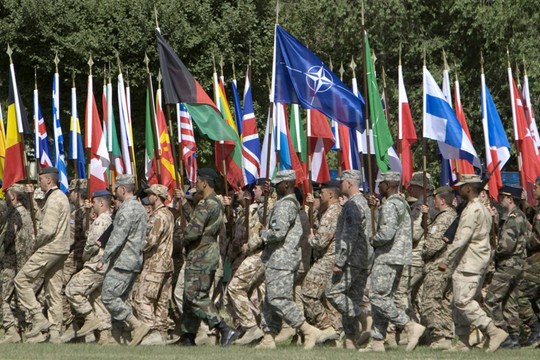“There's too many men, too many people, making too many problems and not much love to go round...”
(Genesis –«Land of confusion»)
As we view the tragedy in Ukraine it is hard to understand why so many billions of dollars and tens of thousands of modern weapons have been squandered in a NATO crusade to expand its borders, writes Stephen Bryen, a former US Deputy Under Secretary of Defense.
The Ukraine war has weakened the United States because it has emptied its treasury and its arsenals. It has undermined US interests elsewhere, especially in the Pacific, where a restless China is now challenging Taiwan, the Philippines and Japan.
But even more is involved and this includes NATO itself.
NATO is the premier defensive alliance set up in 1949 to defend against spread communism in eastern and western Europe. Communism in Europe disappeared in 1991 with the collapse of the Soviet Union.
Despite the collapse, or better yet, disregarding the collapse, instead of NATO dissolving (as did the Warsaw Pact), NATO adopted an expansion policy. It engaged in wars outside of the context of a defensive alliance including Bosnia and Herzegovina, Kosovo, Libya and Afghanistan. And NATO expanded eastward and is still trying to enlarge.
Not counting Ukraine or Georgia, both promised future NATO membership, possibly also Moldova (another NATO target), today NATO is a huge multinational alliance of 32 countries, far larger and covering vastly more territory than the original 12 countries that formed the alliance. In raw numbers NATO has a potential military force of 3.5 million and covers 25.07 million square kilometers (15.58 million square miles) of territory. Combined, NATO members are 966.88 million people and could exceed 1 billion people by the end of the current century.
An important NATO raison d'etre is to challenge Russia, a much-diminished country compared to the scope of the former Soviet Union.
Yet Europe's contribution to its own defense falls far short of its potential and the Europeans rely utterly on the United States for military support including nuclear weapons (although the British and French are nuclear powers). Why is this?
Europe's military power is fragmented and in many respects weak because of a lack of equipment and manpower.
All European fighting forces, with a few exceptions, lack sufficient armor and artillery, and they have given a lot of it away to Ukraine. Equipment is often out of date and poorly maintained.
What is hard to understand is how Europe can spend $295 billion annually for defense and not be able to field well equipped fighting forces? One explanation may be that the Europeans don't intend to do much more than deploy token forces. It is left to the United States to provide for Europe's security and defense.
The US has around 100,000 US servicemembers stationed throughout Europe. This includes Air Force, Army, Marines and Navy as well as Special Forces. The 100,000 includes around 20,000 that were sent to reinforce eastern Europe in 2022 (some to Estonia, Lithuania, Latvia and to Poland and Romania). The best definition is that the Europeans are betting on an American expeditionary force to protect them.
The history of British expeditionary forces (BEF) in Europe is not a happy one.
In World War 2 the BEF (made up of 13 divisions and 390,000 troops) had to be evacuated from Dunkirk (Operation Dynamo), Le Havre (Operation Cycle) and from French Atlantic and Mediterranean ports (Operation Aerial).
There are no armies anywhere today in Europe and Russia that resemble in size and force structure found in World War 1 or World War 2.
If Britain was way behind in preparing its defenses in 1940, Europe is behind today.
Many European countries have emptied their arsenals to support Ukraine, sending tanks, armored vehicles, missiles, air defenses, artillery, ammunition and plenty of other hard to replace weapons.
What does all this mean? It means that while Europe spends a lot on defense ($295 billion) compared to Russia, it does not get much bang for its buck either in equipment or in fighting forces. A good question to ask is where does all the money go?
The US has asked Europe to spend more on defense (and there is evidence these demands are paying off in bigger defense budgets). But it has not yet translated into larger or more capable fighting forces (with the possible exception of Poland). In fact, recession in Europe (especially in Germany and the UK) is likely to force cutbacks in defense spending and even fewer deployable troops.
All this leads to the odd conclusion that without the United States European members of NATO cannot defend their own territory. It also puts the US at a serious geopolitical disadvantage. Empty arsenals and overseas deployments on Europe's borders diminish America's ability to defend its interests elsewhere, especially in the Asia Pacific region.
It also exposes US security to serious risks of entrapment – a Russian inspired war in the Middle East led by Iran, and a Chinese push in east Asia, plus conflict breaking out in Korea, could lead to real disaster ahead.
Expanding NATO is a big risk for the United States, which has unequivocally backed NATO enlargement and the aggressive posture towards Russia.
The time has come to reevaluate America's support of expanding NATO, stresses Stephen Bryen.
read more in our Telegram-channel https://t.me/The_International_Affairs

 11:09 13.09.2024 •
11:09 13.09.2024 •























